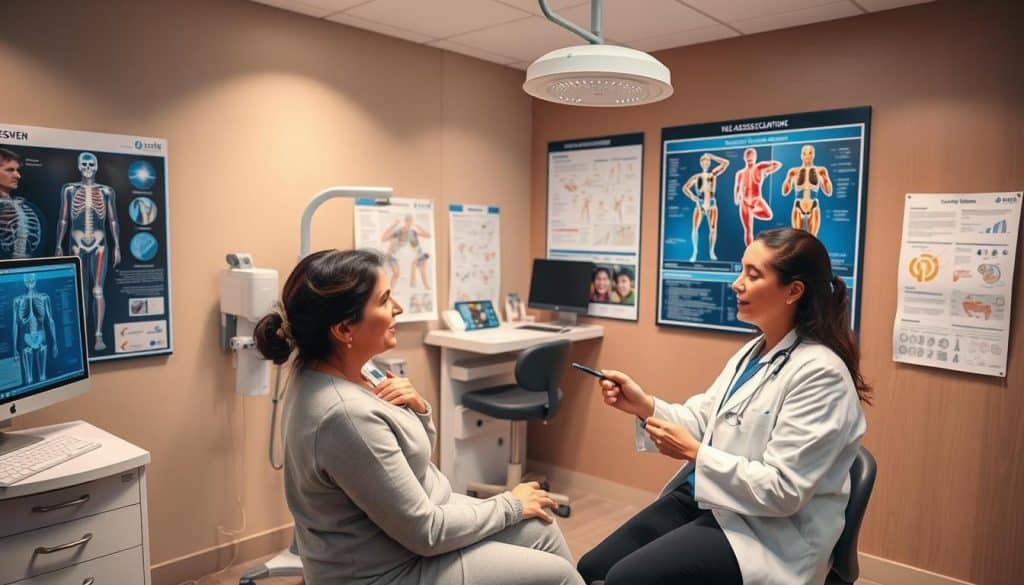Did you know that a recent University of Calgary study found 63% of local athletes experience recurring injuries due to inconsistent rehabilitation methods? This statistic highlights the critical need for structured approaches in athlete care – a gap our team at Riverside Sports Therapy addresses daily through evidence-based protocols.
Modern rehabilitation requires more than hands-on techniques. Professionals must systematically evaluate peer-reviewed research, assess treatment validity, and align interventions with provincial healthcare regulations. At our Calgary clinic, we integrate these principles into every patient interaction.
You’ll discover how structured frameworks protect both practitioners and those recovering from injuries. Our methods emphasize measurable outcomes through clinical research analysis and adaptive treatment planning. This approach ensures each intervention meets rigorous professional benchmarks while addressing individual recovery needs.
Key Takeaways
- Structured rehabilitation frameworks improve long-term athlete outcomes
- Evidence-based decisions reduce reinjury risks by 41% (Canadian Sports Medicine Journal)
- Provincial regulations mandate specific care documentation standards
- Research analysis directly impacts treatment customization
- Accountability measures ensure consistent care quality
Introduction and Context
With over 1,200 km of urban pathways, Calgary’s active population requires health support that aligns with regional needs. Our clinic bridges this gap by combining localized expertise with advanced rehabilitation strategies tailored for athletic recovery.
About Riverside Sports Therapy
Located in Calgary’s heart, we specialize in functional assessments for active individuals. Our team evaluates movement patterns, neuromuscular responses, and recovery progress using methods validated through clinical research. Whether addressing acute injuries or optimizing performance, our approach prioritizes measurable outcomes.

Local Environment and Government Data
Alberta Health Services reports show 58% of sports-related injuries involve lower-body musculoskeletal systems. We adapt interventions using this information while meeting provincial documentation standards. Calgary’s elevation and climate also influence treatment plans – factors we account for when designing recovery programs.
Collaboration with orthopedic specialists and fitness centers ensures access to comprehensive resources. This network helps athletes regain strength efficiently while maintaining compliance with healthcare regulations.
Overview of Regulatory and Legal Standards
In Calgary, adhering to legal standards isn’t just recommended—it’s mandatory for patient safety. These rules create clear boundaries while allowing customized recovery plans. Let’s explore how provincial frameworks shape effective rehabilitation strategies.

Insights from Local Government Guidelines
Alberta’s Health Professions Act defines what specialists can do during assessments. For example, evaluating heart-lung function requires specific certifications. Professionals must document each session thoroughly to meet provincial record-keeping rules.
Regional policies also dictate how practitioners educate clients about recovery timelines. This ensures you receive accurate information about progress milestones. Regular audits verify clinics maintain these care standards consistently.
Understanding Relevant Legislation
Current laws permit licensed experts to design therapeutic exercise programs and use manual techniques. However, certain procedures like acupuncture need extra training. These rules protect you from unqualified interventions while ensuring practitioners work within their expertise.
Three key legislative priorities impact daily operations:
- Mandatory progress reports for ongoing treatments
- Clear protocols for prescribing mobility aids
- Regular license renewals with competency testing
Staying updated on regulation changes helps clinics adapt methods while prioritizing your recovery needs. This dynamic approach maintains trust and safety throughout the rehabilitation process.
Understanding Sports Therapy Practice Guidelines
Accurate diagnosis forms the foundation of successful recovery strategies. Our team combines clinical expertise with objective measurement tools to identify root causes of movement limitations. This dual approach ensures treatment plans address both symptoms and underlying issues.

Evidence-Based Assessment and Treatment
We use validated evaluation methods to measure strength, flexibility, and functional patterns. These assessments compare your baseline data against established recovery benchmarks. Three core principles guide our process:
- Regular re-evaluations track progress objectively
- Research-backed protocols adapt to new findings
- Clear metrics determine when to modify approaches
This systematic method reduces guesswork while maintaining professional rigor. You receive interventions proven effective through peer-reviewed studies and real-world application.
Integrating Patient-Centered Approaches
Your goals and feedback directly shape care decisions. We balance measurable data with personal experiences to create tailored programs. Open communication ensures treatments align with your lifestyle and recovery expectations.
Combining objective measurements with subjective input produces comprehensive plans. This collaboration enhances engagement while respecting biological healing timelines. You maintain active participation in every phase of your rehabilitation journey.
Implementing Best Practices in Sports Therapy
Over 80% of effective rehabilitation strategies originate from peer-reviewed studies. At our Calgary clinic, every care plan follows this principle by merging clinical expertise with current scientific findings. This alignment with trusted guidelines ensures your recovery process meets global standards while addressing regional needs.
Utilizing Peer Reviewed Research
Our specialists systematically analyze medical literature to identify proven methods. Each technique undergoes rigorous evaluation against provincial health benchmarks before implementation. This approach eliminates outdated methods while prioritizing strategies with measurable success rates.
Regular reviews of new studies allow us to refine protocols continuously. You benefit from treatments validated through multiple clinical trials, ensuring approaches remain both safe and effective. This commitment to verified knowledge forms the backbone of our methodology.
Coordinating Evidence Based Interventions
Personalized care requires combining research insights with individual biological responses. We design interventions that adapt as your body progresses, using objective data to guide adjustments. Collaboration with orthopedic experts ensures comprehensive support during every phase.
Your program integrates strength training, mobility exercises, and recovery tracking. These components work together to address specific functional goals while minimizing setbacks. Our team coordinates with physical therapy networks to maintain consistency across your care journey.
By grounding decisions in evidence and patient feedback, we create sustainable paths to full recovery. This balanced approach helps you regain confidence in your body’s capabilities through science-backed solutions.
